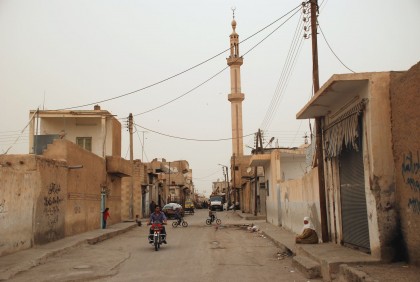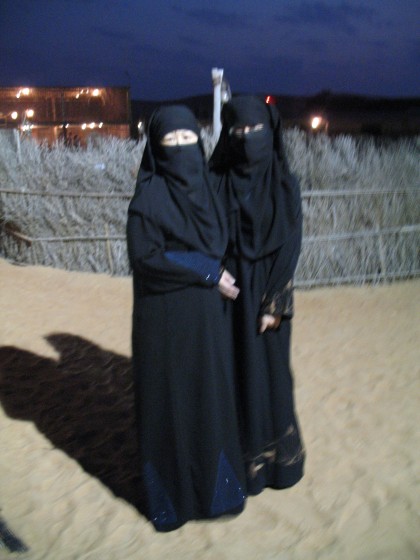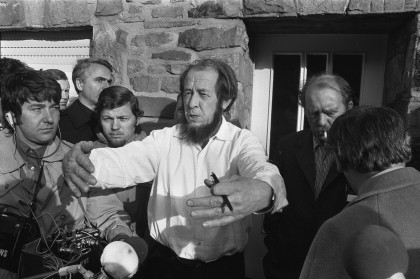The Women of ISIS and the Oscillating Line between Good and Evil
Devra Torres | Nov 22, 2015

"Isis Women and Enforcers in Syria Recount Collaboration, Anguish and Escape," by Azadeh Moaveni, is a horrifying, tangled story of low-level and not-so-low-level collaboration with evil--sometimes tempered by loyalty and conscience, sometimes heightened by self-interest and rationalizations. You read it and you wonder: What if it happened here? What about the heroic resistance I like to imagine I'd offer? How would I really have acted early on in the rise of the Nazis, or the Russian Revolution? What ugly compromises am I making with evil right now?
I should note that of course I have no way of knowing how accurate these stories are. How would I, or how would any of us? Possibly these women are lying, or embellishing their stories, from fear for their lives, or from who knows which other motives. Maybe the journalist's own agenda is giving us a skewed picture. (It's been known to happen!) But these are scenarios worth pondering, whatever the facts.
Moaveni tells of three young women who went from carefree, westernized girls to all-female-police-force morality enforcers and wives of terrorists, to refugees taking shelter in Turkey. In the course of these abrupt transformations they had to navigate repeated decisions about whether and how much to collaborate with ISIS ("The Organization"), once it had taken over their city.
Their early life gave no hint of what was coming:
All three of them describe themselves as fairly typical young women of Raqqa [Syria]. Aws was more into Hollywood, Dua into Bollywood. Aws's family was middle-class, and she studied English literature at a branch of Euphrates University....She devoured novels, some by Agatha Christie, and especially Dan Brown books...
Dua's father is a farmer, and money is tighter....There were long walks on Qalat Jabr, the 11th-century fort on Lake Assad; coffee at Al Rasheed Park, and Raqqa Bridge, where you could see the city lights at night. In the gardens and amusement park in the town center, there was ice cream and communal shisha pipes to gather around.
These girls had to navigate repeated decisions of whether or how much to collaborate. So how did they decide? Maybe "decide" is a stretch: they were pressured by their families to marry the jihadis, and it's not clear what an attempted refusal would have accomplished. Their city had became the "command center" of ISIS, and "[t]hose who resisted, or whose family or friends had the wrong connections, were detained, tortured or killed."

But to the extent that there was a choice to be made: what did they base it on? Agatha Christie and Dan Brown? They weren't devout Muslims, nor were they American-style atheists or agnostics. Like most people, they seem to have been guided by a mixture of self-interest and a hodgepodge of loyalties and moral intuitions. And pop-culture influence, as when one girl is described waiting for her relatives to negotiate with her suitor:
Her father and grandfather met with Abu Muhammad in the living room, telling Aws that she could see him at a second meeting if he offered a suitable dowry. But Aws was too much of a romantic, and had seen too many Leonardo DiCaprio films, to agree to marry a man whose face she had not seen.
* * * * *
It's tricky enough for those of us who have all the benefit of Catholic moral teaching--all the ins and outs of the principle of double effect, the prohibition on doing evil that good may come, the distinctions between near and remote, direct and indirect cooperation. We weigh the gravity of the matter, the probability of the consequences, trying to apply the relevant principles--and still, it's often far from clear.
And then, their wedded lives turned out to be a bizarre blend of seeming-normalcy and something grotesquely abnormal. One girl, Aws, entered into a sudden marriage of convenience at the behest of her relatives but then found that it "felt real--even affectionate." But
The Organization also cast a long shadow over her marriage. Though Aws had always wanted a baby, Abu Muhammed asked her to take birth control pills....When she pressed him, he said his commanders had advised fighters to avoid getting their wives pregnant. New fathers would be less inclined to volunteer to carry out suicide missions.
She loved her husband, but then he died on a suicide mission. She was hastily married off to someone else, but soon afterward he disappeared with his pay, and she was relegated to her parents' house, without even the status of martyr's widow.
Another girl, Asma, describes her motivation in joining the women's morality police.
For me, it was about power and money, mostly power. Since my relatives had all joined, it didn't change a great deal to join. I just had more authority.
The job involved turning over violators of ISIS's interpretation of sharia--strangers, relatives, or lifelong friends-- for beatings and stonings. It also included a 15-day weapons course. But along with this coldheartedness, there's also concern to protect the relatives she left behind:
Once a week, she emails and calls a friend in Raqqa to complain that her family has spurned her. It is untrue, but she hopes that if she says it often enough, it will spread and perhaps even be heard by Islamic State intelligence, and that she will protect her family from any consequences of her departure.
* * * * *
Who can untangle it all and sort it all out? As Aleksander Solzhenitsyn, who knew something about totalitarian nightmares, says in The Gulag Archipelago

Gradually it was disclosed to me that the line separating good and evil passes not through states, nor between classes, nor between political parties either -- but right through every human heart -- and through all human hearts. This line shifts. Inside us, it oscillates with the years. And even within hearts overwhelmed by evil, one small bridgehead of good is retained. And even in the best of all hearts, there remains ... an unuprooted small corner of evil.
